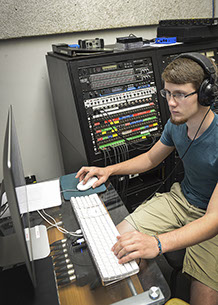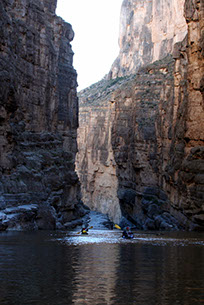PLAYING FAVORITES
The music recorded here, as the title suggests, is quite simply a compilation of my favorite pieces to perform. What I love about each one is its ability to engage a diverse audience, making for enjoyable and exciting musical moments. Most of the pieces have modern elements of jazz, harmony, and rhythmic complexity combined with profuse technical challenges and beautiful lyrical sections that appeal to my jazz background. Audiences respond enthusiastically to each. Three are well-known classics for the trombone that have been recorded before, but I am particularly pleased to introduce to the world River Runner, which reflects a paddling adventure in Big Bend National Park. Composer Stephen Lias was with us on that trip, and he wrote this piece for me.
I’ve been fortunate in my career to be able to pursue performing as part of my academic career. I knew exactly what I wanted to do from an early age. When I was growing up, it was unusual for a girl to play trombone; fortunately, I never thought much about that and neither did my parents. My family supported me at every turn. It has been a tremendous challenge finding the right balance between family, work, friends, God, and myself. I am more than privileged to have a supportive husband and two amazing children who have willingly shared my journey.
-Deb Scott
TROMBONE CONCERTO was composed in 1988 for the occasion of the first international trombone symposium in London. This substantial
twenty-minute piece is in three movements, “Allegro,” “Adagio,” and “Presto.” Because trombonists from the worlds of pop and jazz would attend the symposium as well as classical artists, I decided to make it musically ecumenical, and it was deliberately tailored to have a wider appeal than the usual classical audience. The third movement, in particular, was well-received. The concerto was written for the Swedish player Christian Lindberg, who premiered it.
-Derek Bourgeois (b. 1941)
COLLOQUY FOR SOLO TROMBONE is an emotionally connective piece of Americana, contemporary, and romantic, influenced by the idols of my youth: Aaron Copland and Leonard Bernstein. The work was conceived in one movement. Since the original soloist was a gifted jazz performer, I was asked to include a jazz section in the piece. It was written during a most difficult period of national angst. You can hear the forces of opposing
polarities in the music. With the knowledge that music is a powerful force for inspiration, I was filled with a desire to inspire and to be a positive energy in the world.
-William Goldstein (b. 1942)
RIVER RUNNER How do you capture the thrill, fear, effort, and joy of an adventure in music? That was the challenge I faced as I wrote my first piece of music inspired by a national park. Having paddled for three days through Big Bend’s Santa Elena Canyon, I struggled with how to translate the experience into a new composition. What do rapids sound like? What rhythms evoke a sense of anticipation? How should the music be structured to capture the arc of
the journey?
In solving this problem, I decided to focus on three focal moments of the trip and to utilize a different approach for each. For the opening movement (“Lajitas”), which focuses on the excitement and anticipation of setting out, I wrote down actual words of what we were thinking and set them to music. The middle movement (“The Sentinel”) turns the shapes and moods of the somber landscape of the Desert Southwest into plaintive melodies and foreboding chords. The final movement (“Rock Slide”) is entirely visceral and kinetic. I tried to capture the terrifying and exhilarating physical sensation of bumping into boulders, skittering over loose gravel, and being pulled into a dangerous current.
-Stephen Lias (b. 1966)


Variations on CARNIVAL OF VENICE was composed by Jean-Baptiste Arban (1825-1889) in celebration of the Venetian Lenten festival. In 1987, Donald Hunsberger penned this arrangement for performance by Wynton Marsalis on trumpet accompanied by the Eastman Wind Ensemble. It combines fast, highly technical passages, which convey the glittering glory of the masked processions and grand parties of the elite with the slow, dizzy sound of the crowd staggering through the streets.
-G.W. Scott
This project was partially funded by a Stephen F. Austin State University Faculty Research/Creative Activity Grant.




Photography in order of appearance:
This starting point for loading the kayaks with gear named “Lajitas” inspired the first movement.
“Rock Slide”, a dangerous rapid on the Rio Grande River, inspired the third movement.
Ryan Davis, Recording session engineer
Camping in Santa Elena Canyon
Paddling on the Rio Grande River
Approaching “The Sentinel” mountain peak (pictured here) through a calm part of the river inspired the second movement.
© NAVONA RECORDS LLC. ALL RIGHTS RESERVED.
Navona Records offers listeners a fresh taste of today's leading innovators in orchestral, chamber, instrumental, and experimental music as well as prime pieces of classic repertoire. Our music is meticulously performed by the finest musicians and handpicked to ensure the most rewarding listening experience.
223 Lafayette Road
North Hampton NH 03862
PRESS INQUIRIES
press (at) parmarecordings.com
603.758.1718 x 151